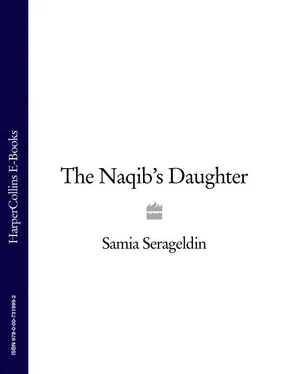‘The drafting of it is not so difficult. Getting it signed by the other ulema will be the hardest part, and without them the letter has no credibility.’ He put down his quill. ‘But never mind that now. Come here, Zeinab, sit before me. I have great news for you, child.’
‘Yes, Father?’
‘You are to be married this month.’
‘Married, Father? Who –?’
‘It is a great honour, a very great honour. You are betrothed to the commandant of the French – Bonaparte himself.’
Zeinab felt the world spin around her, and then her mother sprinkling her face with rose-water and laughing. ‘The child is overwhelmed. Praise be to God, Zeinab! Thank your father! You are the luckiest girl in Cairo today.’
Zeinab nodded, still speechless. She was indeed the luckiest girl in Egypt. The commander of all the French! And an avowed Muslim! Even if he had been old and ugly, it would have been a great honour, but he was young and beautiful as an angel: she had peeked at him through her lashes at the banquet.
Her mother put one hand to the side of her mouth and threw back her head to ululate with rejoicing, but Shaykh Bakri stopped her with an upraised hand. ‘Not now, woman! It is not the proper time. Wait until I get this letter signed! Can you imagine if the news gets about! I have too many enemies in the diwan as it is.’
What did the happy news of her betrothal have to do with her father’s enemies in the diwan? Zeinab wondered. But only for a moment.
‘Please take a seat, Sitt Nafisa,’ Ambassador Magallon offered. ‘We are listening.’
Sitt Nafisa inclined her head and sat down, tucking her sheer yashmak more securely behind her ear. She took a deep breath as she faced the three men on the bench before her in the west courtyard of Elfi’s palace: Magallon, and the two other Frenchmen who had been appointed directors of the newly created Registry of Civil and Commercial Affairs. Malti the Copt sat beside them as legal expert, which was surprising enough in itself, for he was a tax collector by profession and entirely ignorant of Islamic law.
‘Thank you.’ She cleared her throat. She reminded herself of her vow: to maintain the ties of civility with the French at all costs. She was reluctant to put those fragile ties to the test so soon, but the suits she had come to plead could not be postponed. She began with the obligatory compliment: ‘May my request fall on the ears of justice and magnanimity. I have come today with three suits, one of which is my own, and two more on behalf of others.’ She looked at the translator, Venture du Paradis, who conveyed her meaning.
‘Proceed, madame,’ Magallon nodded.
‘As you may know – at least Ambassador Magallon knows – my sabil on Sugar Street –’
‘A charitable waterworks, with a public fountain and baths for the poor,’ Magallon explained to his colleagues.
‘Thank you, sir. Concerning my sabil, then; taxes have been imposed on the religious endowment that supports it, although all such purely charitable works – sabils, mosques, hospices, almshouses, orphanages and the like, have from time immemorial been exempt from taxes – as Ambassador Magallon, who knows our ways, can attest.’
‘Indeed, madame,’ Magallon concurred. ‘But that is not the way of the Republic.’
‘Sir, you know the poor depend on these charities, and it would mean great hardship for them if they were cut off. Not to mention the ill will that will accrue to the French as a result of these measures.’
‘Surely, madame, the revenue from your caravanserai at Bab Zuweila – the commissions the merchants pay you to use the trading floor and the store rooms, the workshops, the lodgings and baths – those revenues alone must come to a considerable sum.’
‘They did, sir, and every piaster was dedicated to support the sabil. But the income from my wikala at Bab Zuweila has plummeted since the invasion. As you know, the caravans from Mecca are disrupted, trade and pilgrimage are down to a trickle, and what little revenue there is, is entirely consumed in paying the taxes you impose.’
‘You are a very wealthy woman, madame, and I am sure you will find the means to continue to fund your charity.’ It was one of the other two Frenchmen – Tallien – who spoke. He made as if to rise.
‘Sir, you have confiscated my estates!’
‘That, madame, is the fault of your husband, Murad Bey, and of his amirs, who continue to wage war against us and lead the insurgency in the south.’ Tallien’s tone was acrimonious. ‘Will that be all?’
Nafisa took a deep breath. Clearly, she would get no sympathy for the plight of her sabil. Mindful of her pledge to herself, she knew that the wiser course would be to withdraw. But she had promised to bring two other suits, and she could not disappoint those who relied on her. She forced herself to continue with her supplication.
‘I will not trouble you much longer, sir. But I promised to speak on behalf of Sitt Adila, Ibrahim Bey’s daughter.’ She paused, looking directly at Magallon and Malti the Copt, hoping to remind them that Adila had taken the Franj and the Christians into her home for protection before the French entered Cairo. ‘Sitt Adila’s husband was killed in the Battle of Imbaba, and she is now trying to recover some of his property. But she is being told that she should have declared this inheritance within twenty-four hours of his death, and that it is too late now, the property is impounded for the benefit of the French Republic. Surely it was not possible for her to know for a certainty when her husband died in battle?’
‘We cannot take all these circumstances into consideration, and in any case the property of the renegade Mamlukes is considered forfeit, as you know. Is there anything else, madame?’ Magallon made as if to rise.
‘One last suit, sir, I beg of you. Believe me, I would not stand here before you,’ she added, trying to keep the bitterness out of her voice, ‘if it were not on behalf of someone even more helpless than I. It concerns my Mamluka, Fatoum, whom I have raised since childhood. I had sent her with my chief eunuch, Barquq, to run an errand for me at my Giza estate – unwisely, I realize, in these lawless times.’ Nafisa had sent Fatoum to recover a coffer of jewellery buried under the planks of the hall at the Giza house; there had been no one but Fatoum and Barquq whom she could trust with such a task. There was no need to go into these details, however. ‘As I said, sir, on the route to Giza they were attacked by a band of soldiers and the girl was abducted. My eunuch, who was severely injured by a blow to the head but managed to return home, says the soldiers were French or belonged to a French militia. Since then I have had no news. What has become of Fatoum? I would be most grateful if you would make inquiries.’
‘We will make inquiries, madame. If the girl was injured or killed, the perpetrators will be hanged, even if they turn out to be French.’
‘Thank you, sir! I knew I would not appeal in vain to French justice. And thank you for your patience in listening to me.’ She rose, gathered her abaya about her, bowed, and exited the hall.
Did the French even realize how unpopular the measures they were taking would make them, imposing taxes on the very charities the poor relied on for shelter and water, schooling and hospice care? They should not be surprised if there were an uprising of the people.
As she rode back towards her house in the Red Quarter, her chief eunuch on the mule before her and a maid on the donkey behind her, people in the street recognized Nafisa in her white veils and greeted her with cries of, ‘God bless you, Sitt Nafisa the White.’ She nodded to Barquq to hand them a coin or two, discreetly; it pained her not to be able to give more.
Читать дальше












